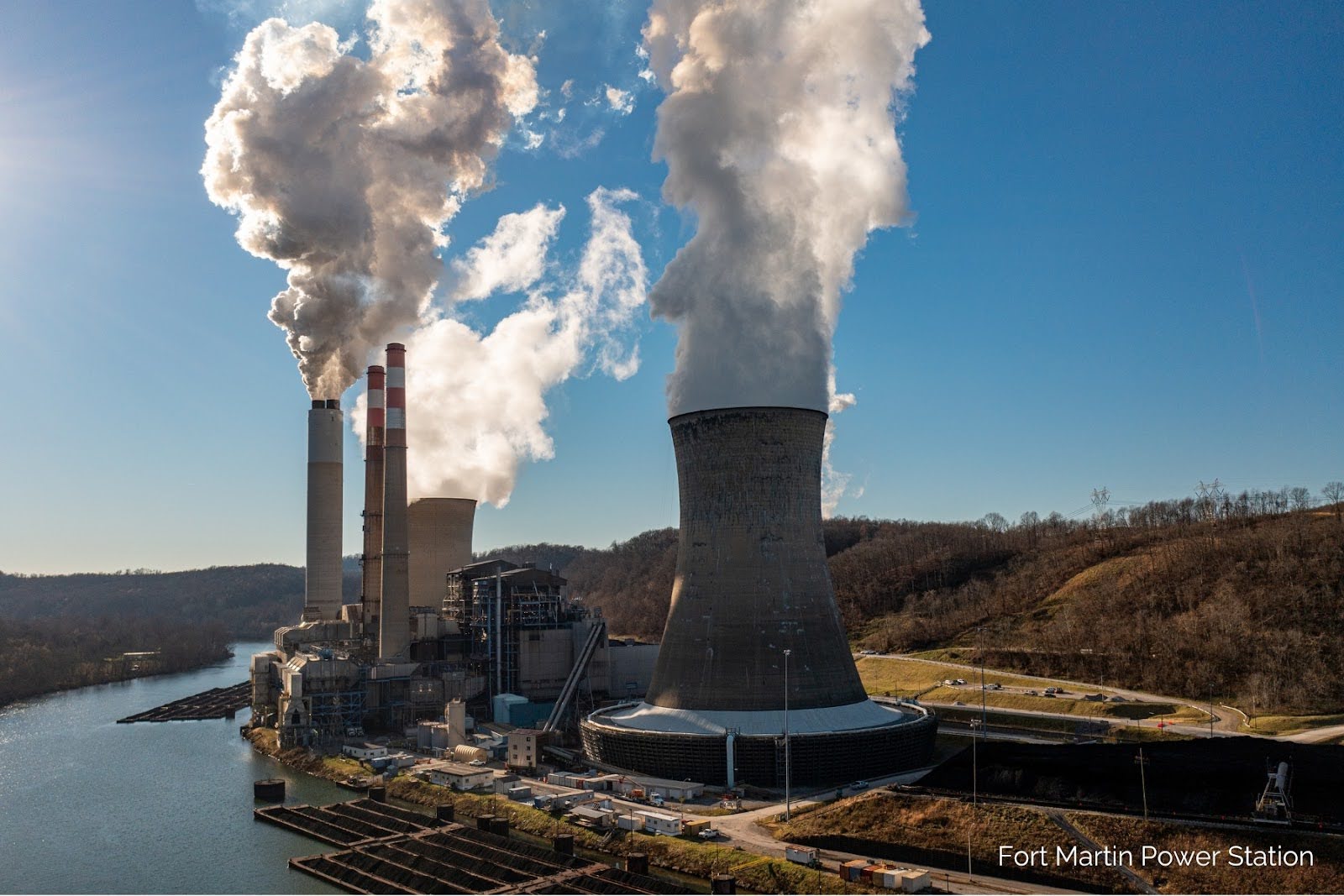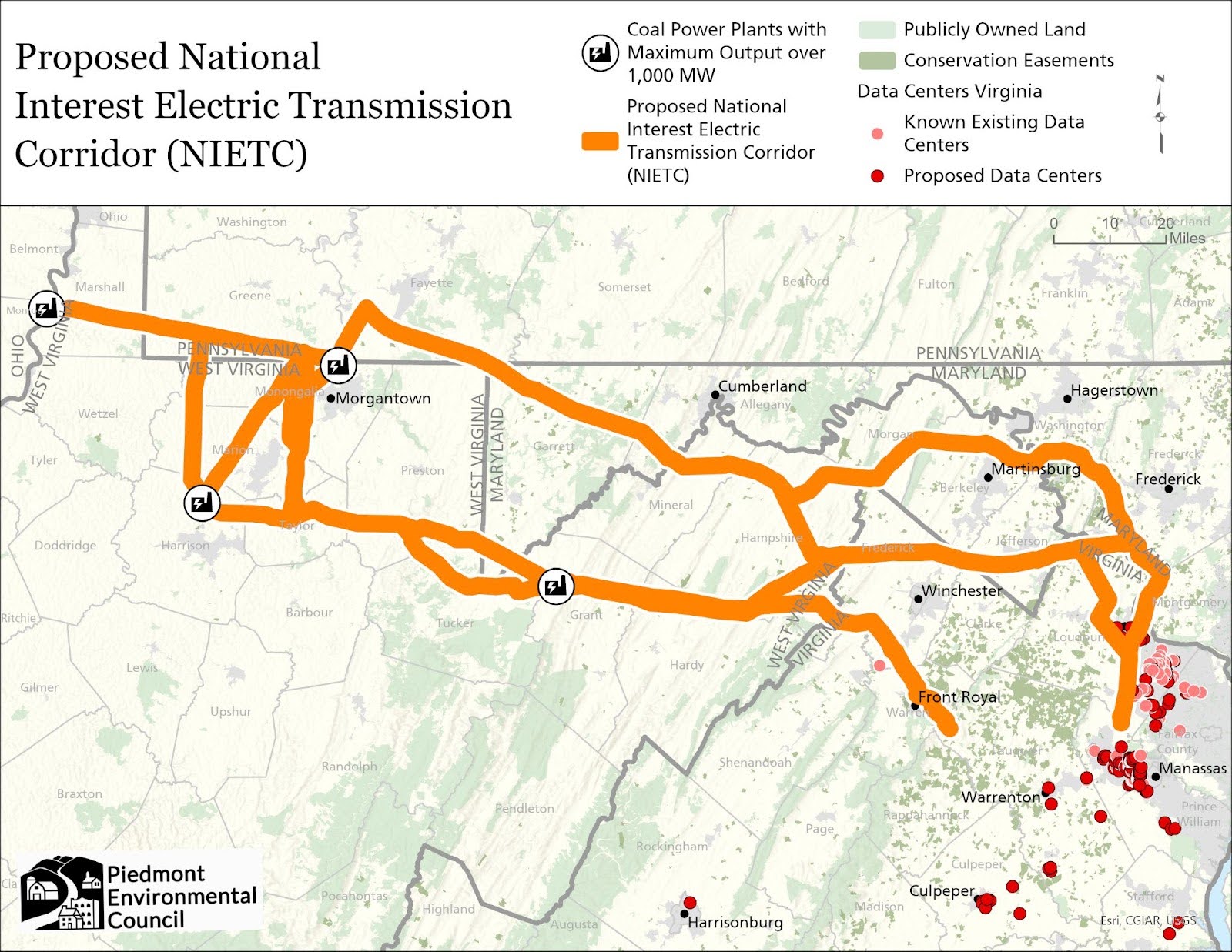The following text was sent out via email on Jun. 14, 2024. Sign up for PEC email alerts →

Dear Supporter,
If you’re like many other Virginians concerned about the rising cost of energy and the impacts of air pollution, you’ll want to learn how you can take action before June 24, 2024, on a new federal transmission line corridor designation proposed for our region.
Earlier this year, the U.S. Department of Energy (DOE) announced guidance for establishing “National Interest Electric Transmission Corridors”, or NIETCs, to accelerate the expansion of electric transmission corridors across the country. This designation would allow the Federal Energy Regulatory Commission (FERC) to issue permits for transmission lines within these priority corridors if state authorities, like Virginia’s State Corporation Commission (SCC), decide not to approve a transmission project or take more than a year to decide.
One of DOE’s preliminary priority corridors is the Mid-Atlantic National Interest Electric Transmission Corridor, a web of electric transmission routes highly impactful to communities and natural, historic and agricultural resources in Virginia, Maryland, West Virginia and Pennsylvania. This corridor of transmission lines would primarily connect coal power from as far away as Ohio to energy-hungry data centers in Northern Virginia.
It would also enable expanded access to polluting fossil fuels over the next five to 10 years in a blow to our Virginia Clean Economy Goals, local air quality and justice for Appalachian communities. The construction of these lines would impact your electric bill and might result in transmission lines cutting through public or private lands near where you live or in places you care about. Read more about potential impacts →
Action is urgently needed on this rushed and under-advertised designation process that would have far-reaching impacts on Virginia communities and the environment. Please write the U.S. Department of Energy and your elected representatives in Congress by 5 p.m. ET on June 24, 2024, to make sure your voice is included.
Background and context
The idea behind the National Interest Electric Transmission Corridor designation is to expedite the process of grid modernization by using federal intervention to build new transmission lines as quickly as possible in areas of the country deemed to be of national interest. Done right, these federal corridors could help the U.S. meet its clean energy goals on a timeline that prevents the worst of climate impacts. However, out of the 10 National Interest Electric Transmission Corridors announced on May 8, the Mid-Atlantic corridor was the only one that DOE identified as not serving to connect clean energy to the grid, tacitly acknowledging the connection to natural gas and coal plants.

As we’ve shared in other communications, Virginia will experience a doubling or tripling of energy demand over the coming years due to a single industry – data centers, because its electricity usage is so high and ever-increasing. With new applications of artificial intelligence, collection and monetization of personal data, and continued reliance on cloud computing, data centers in Northern Virginia are expected to expand their footprint further into places west and south, resulting in Dominion Energy and other utilities proposing an onslaught of new generation and transmission infrastructure.
Right now, that involves building new natural gas plants in vulnerable communities and keeping coal generation plants previously planned to be retired online. It also means new transmission line proposals, such as controversial lines in eastern and western Loudoun County and numerous other projects in Prince William, Fauquier, and Culpeper counties, and the Fredericksburg area. If you’re a Virginia resident with a monthly electric bill, you might be surprised to learn that you’d be helping to pay for all these infrastructure projects. This is true even though residential energy demand has remained flat.

From PEC’s perspective, the Mid-Atlantic priority corridor will add insult to injury by supercharging the data center and fossil fuel industries, adding capacity and new lines between the Northern Virginia data center market and coal power plants of West Virginia. This decision is inconsistent with national goals for climate action and leaves a lot of questions unanswered as to how we’ll transition away from fossil fuels. If approved, this corridor will likely signal to the data center industry that DOE is willing to forfeit climate goals for its singular benefit. That could encourage more data center development than is already projected, resulting in a snowball effect driving even larger energy demands in the Dominion Energy service area.
How to take action
The Mid-Atlantic priority corridor is a bad deal for Virginians. Here’s how you can take action to help put Virginia communities before the data center industry.
- By 5 p.m. ET on June 24, 2024, use this form letter or email NIETC@hq.doe.gov to write the U.S. Department of Energy and your elected representatives in Congress.
- Providing comment at this stage in the designation process will ensure you have legal standing as a party to any future legal proceedings.
- To help, talking points to incorporate can be found toward the bottom of this website page: pecva.org/nietc.
- Providing comment at this stage in the designation process will ensure you have legal standing as a party to any future legal proceedings.
- Contact your elected representatives in Congress and ask them to support the Artificial Intelligence (AI) Environmental Impacts Act of 2024, which encourages greater transparency and accountability from the data center industry.
- Contact your representative and senator in the Virginia General Assembly and ask for legislation that provides transparency and oversight of the data center and utility industries.
- Contact local government and share your concerns about the need for better planning and zoning around new data center development where you live.
- Check out the many resources available on our website page: pecva.org/datacenters.
- Find events by following us on Facebook or visiting pecva.org/events.
Prefer to email your elected officials individually? Find them at: whosmy.virginiageneralassembly.gov
Data center development in Virginia has gotten out of control and we need your help getting government at all levels to take seriously what is at stake. Fueling the continued growth of the data center industry in Virginia at the expense of our health, environment and communities, is unreasonable — especially because Virginia already houses and subsidizes the largest data center market in the world.
Thank you for taking urgent action to write the U.S. Department of Energy about the Mid-Atlantic designation, and for your continued support and attention to this larger issue.
Should you have any questions, please reach out or feel welcome to contact any of our amazing land use team on the ground in your county.
Sincerely,
Julie Bolthouse, AICP
Director of Land Use
jbolthouse@pecva.org
(540) 347-2334 x7042
